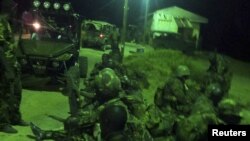NEW YORK —
East African troops have driven the Somali militant group al-Shabab from its last stronghold in the southern port of Kismayo. The United States believes the al-Qaida affiliated group is seriously degraded but will continue fighting.
Al-Shabab abandoned Kismayo in the face of a combined assault by Kenyan, African Union, and Somali government troops. Announcing its withdrawal Saturday, the militia group vowed to strike back.
U.S. Assistant Secretary of State for African Affairs Johnnie Carson believes the fight will continue as al-Shabab is pursued by an African Union intervention force known as AMISOM.
"They have not been defeated entirely yet. We expect that there will continue to be asymmetrical operations against AMISOM and against the government, but they have been effectively degraded," said Carson.
Al-Shabab is seeking to impose a hardline form of Islamic law in Somalia. It once controlled most southern and central regions, including the capital Mogadishu, but has lost most of its territory over the past 18 months.
In an interview with VOA, Carson said the success of AMISOM along with Ethiopian, Kenyan, and Somali forces gives a big boost to Somalia's new government.
"All of this represents not only a military success but it contributes to the political progress and stability and the return to stability that we have been missing in that country," said Carson.
Somali leaders this month elected a new president. Carson says the international community must help President Hassan Sheikh Mohamud's government restore public services such as schools and health clinics while training a strong Somali military that answers to constitutionally-elected civilian authority.
"No more warlordism, no more clan and sub-clan militias, no more regional forces but a military that is well-trained and subservient to the government at hand," Carson added.
Kenyan forces entered Somalia last year after a series of cross-border kidnappings that Nairobi blamed on al-Shabab. Losing the port of Kismayo not only deprives the al-Qaida-affiliated group of its main route for weapons but also means a significant loss of revenue from taxes.
Al-Shabab abandoned Kismayo in the face of a combined assault by Kenyan, African Union, and Somali government troops. Announcing its withdrawal Saturday, the militia group vowed to strike back.
U.S. Assistant Secretary of State for African Affairs Johnnie Carson believes the fight will continue as al-Shabab is pursued by an African Union intervention force known as AMISOM.
"They have not been defeated entirely yet. We expect that there will continue to be asymmetrical operations against AMISOM and against the government, but they have been effectively degraded," said Carson.
Al-Shabab Timeline
Al-Shabab Timeline
2006: Launches insurgency to topple Somali government, impose Islamic law
2008: U.S. declares al-Shabab a foreign terrorist organization
2009: Seizes control of parts of Mogadishu, Kismayo
2010: Expands control across central and southern Somalia; carries out deadly bombings in Kampala, Uganda in first attack outside Somali
2011: Blocks drought/famine aid from areas under its control
2011: East African leaders declare al-Shabab a regional threat, Ethiopian, Kenyan troops enter Somalia to pursue the group, which is driven out of Mogadishu
2012: Declares itself an al-Qaida ally, loses ground in Somalia, troops advance on the group's stronghold Kismayo
In an interview with VOA, Carson said the success of AMISOM along with Ethiopian, Kenyan, and Somali forces gives a big boost to Somalia's new government.
"All of this represents not only a military success but it contributes to the political progress and stability and the return to stability that we have been missing in that country," said Carson.
Somali leaders this month elected a new president. Carson says the international community must help President Hassan Sheikh Mohamud's government restore public services such as schools and health clinics while training a strong Somali military that answers to constitutionally-elected civilian authority.
"No more warlordism, no more clan and sub-clan militias, no more regional forces but a military that is well-trained and subservient to the government at hand," Carson added.
Kenyan forces entered Somalia last year after a series of cross-border kidnappings that Nairobi blamed on al-Shabab. Losing the port of Kismayo not only deprives the al-Qaida-affiliated group of its main route for weapons but also means a significant loss of revenue from taxes.





